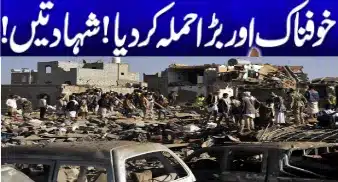Deadly airstrike kills dozens amid global condemnation, sparking outrage and fears of escalation. Read the latest updates, reactions, and analysis.
Deadly airstrike kills dozens amid global condemnation, sparking urgent appeals for accountability and raising fears of further escalation. International organizations and governments have expressed concern over the growing civilian toll, calling for restraint and immediate humanitarian assistance.
Deadly Airstrike Kills Dozens Amid Global Condemnation – Details of the Attack
According to official statements and verified reports, the assault involved multiple fighter jets that launched coordinated missile strikes on densely populated residential and commercial districts. The attack damaged several high-rise buildings, infrastructure, and crowded marketplaces, triggering massive fires and widespread destruction. Hospitals in the area immediately declared a state of emergency as ambulances and first responders rushed to evacuate the injured. Witnesses confirmed that the first blast was followed by a sequence of successive strikes, amplifying panic and trapping civilians under rubble.
Human Casualties
Preliminary estimates from emergency services indicate that dozens of people were killed instantly, while more than one hundred were injured. Authorities have warned that the death toll could rise further as search and rescue operations continue. Many residents remain missing, feared buried beneath collapsed structures. Hospitals are overwhelmed, with medical personnel calling for urgent supplies, blood donations, and international assistance. Temporary medical camps have been established near the affected districts to provide emergency treatment.
Voices from the Ground
Survivors described scenes of devastation. One resident explained: “The explosion shattered everything around us. People were running in every direction, children were crying, and buildings were collapsing.” Families displaced by the destruction now face uncertain futures, with many left homeless. Aid volunteers reported that survivors are in urgent need of food, water, and shelter.
Global Reaction
The deadly airstrike has drawn widespread condemnation from the international community. The United Nations Secretary-General denounced the incident as a violation of international humanitarian law, urging immediate restraint and protection of civilians. The European Union, Organization of Islamic Cooperation (OIC), and multiple humanitarian NGOs echoed these concerns, demanding an independent investigation to hold those responsible accountable. Human rights organizations stressed that deliberate or indiscriminate attacks on civilians constitute war crimes under international law.
Regional Concerns
Neighboring countries expressed deep concern that unchecked violence could destabilize the entire region. Analysts warned that the strike risks escalating existing tensions, potentially igniting broader conflict. Diplomatic sources confirmed that urgent backchannel discussions are underway to prevent the violence from spreading across borders. Governments in the region have also raised security alerts in anticipation of potential retaliatory actions.
Political Statements
Local authorities condemned the airstrike as a deliberate attack on civilians. Government representatives pledged immediate aid to affected families and promised ongoing rescue operations under difficult conditions. Officials called upon the global community to impose accountability mechanisms, arguing that failure to act could embolden future violations. A senior leader stated: “This tragedy is not just an attack on our city — it is a violation of humanity that the world must not ignore.”
Expert Analysis
International security experts emphasized that airstrikes targeting civilian populations rarely achieve long-term objectives. Instead, they often intensify hostilities and hinder prospects for peace. Analysts suggested that the timing and scale of the attack may have been aimed at exerting leverage in ongoing political or military negotiations. Scholars of conflict studies highlighted that without meaningful diplomatic engagement, such actions deepen divisions and prolong instability.
Media Coverage
Global media outlets devoted extensive coverage to the airstrike, broadcasting images of collapsed buildings, smoke-filled streets, and grieving families. Online platforms saw hashtags condemning the violence trend worldwide. Journalists in the region reported from emergency sites, documenting the humanitarian crisis in real time. Social media platforms were flooded with calls for accountability and demands for stronger international intervention.
Humanitarian Efforts
Humanitarian organizations have mobilized rapidly to assist survivors. Relief agencies distributed food, clean water, and emergency supplies to displaced families. Community centers, schools, and mosques have been converted into temporary shelters for thousands who lost their homes. International aid groups announced plans to send medical teams, psychological support staff, and financial assistance. Several countries pledged direct humanitarian aid, highlighting global solidarity with the victims.
Possible Consequences
Experts warned that the airstrike could trigger a new cycle of retaliatory violence. If additional attacks follow, the conflict could escalate into a broader regional crisis. Diplomats emphasized the urgent need for de-escalation to prevent spillover effects that could destabilize neighboring states and disrupt fragile peace processes. Humanitarian specialists cautioned that a prolonged crisis could generate large-scale displacement and strain regional resources.
Historical Context
The region has long been marred by cycles of conflict, failed peace initiatives, and intermittent escalations. Previous airstrikes in similar contexts have historically failed to deliver sustainable political or security outcomes. Instead, they have often fueled resentment, expanded displacement, and created long-term humanitarian crises. This latest event adds to the region’s troubled history of civilian suffering amid geopolitical rivalries.
The Road Ahead
Rescue operations remain the immediate priority, with responders working around the clock to locate survivors under the debris. In the longer term, experts argue that durable solutions will require political negotiation, accountability mechanisms, and stronger protections for civilians. International organizations are likely to increase diplomatic pressure in the coming days, but whether that pressure translates into effective measures remains uncertain. Past experiences suggest that condemnation without enforcement often fails to prevent future tragedies.
Conclusion – Deadly Airstrike Kills Dozens Amid Global Condemnation
The deadly airstrike that killed dozens and injured many more has left a community devastated and heightened global alarm. As humanitarian agencies race to provide relief, the international community faces renewed pressure to take decisive action. Without meaningful accountability and diplomatic intervention, this tragedy risks becoming another chapter in a continuing cycle of violence. The attack serves as a stark reminder of the urgent need to protect civilians and uphold international humanitarian law in conflict zones.

